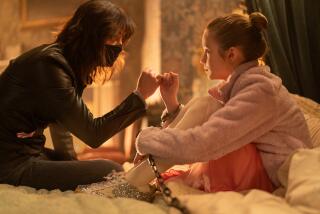Grecian turn
Her 40-pound weight loss isn’t -- insists Nia Vardalos -- some diabolical plan to land herself in the pages of People magazine, amid Valerie Bertinelli, Melissa Joan Hart and myriad new celebrity mothers proving their moral and genetic superiority by dropping their baby weight within days of giving birth.
“I find it strange being mentioned as some sort of accomplishment or triumph,” says Vardalos, the unlikely writer-star of the unlikely box-office smash of 2002, “My Big Fat Greek Wedding.” It’s only weight loss, after all, not curing cancer, and the only reason she bothered was because “I had to. I had a blood sugar issue,” as well as thyroid disease, and diabetes in her family tree, and so her doctor insisted. “To be told you have to do something, what a bummer,” she says.
It’s clear that Vardalos doesn’t like being told what to do or adhering to some Hollywood conventions. This is the woman who wrote her own ticket into Hollywood, after being infamously told by an agent that she wasn’t pretty enough to be a leading lady or fat enough to be a character actress.
“I’m like this every woman in terms of my looks,” Vardalos says over a glass of iced tea at L’Hermitage. “I had to write my scripts in the first place because I don’t look like Nicole Kidman. I continue to write parts I want to play.”
In person, the actress radiates a kind of sunny, albeit definitely determined, optimism. She wears white jeans, a loose black, print top, and her hair tucked up under a jaunty cap. Her skin looks particularly radiant and tawny, though she points out the zit on the top of her forehead. Her laugh is ready and enveloping.
At 46, Vardalos returns to the screen this summer after a three-year absence, with two romantic comedies. In “My Life in Ruins” (in theaters Friday), Vardalos plays a burned-out tour guide, resigned to a bus trip from hell around Greece with a disparate bunch of tourists, who falls for a Greek bus driver. In “I Hate Valentine’s Day” (July 3), which she also wrote and directed, she stars as a snappy, commitment-phobic florist who will date men only five times before a mandated breakup, a plan that goes awry when John Corbett (her “Greek Wedding” costar) opens a restaurant on her street.
As she notes, “In the movies, you often see the average-looking guy with the incredibly attractive woman. In my movies you see the average-looking woman with the super hot John Corbett. I’m happy to make those movies for all of us women. Guess what? We need people like me on screen. That’s what movies are. You go and escape for a sec.”
One of the themes of “My Life in Ruins” is a woman who’s lost her kefi, which is the Greek word for life force or passion. It’s an idea that clearly resonated when Vardalos read the script (which was written by “The Simpsons” writer Mike Reiss), and she later tweaked the script to accentuate it. Despite the success of “Big Fat Greek Wedding,” which catapulted Vardalos from struggling unknown to Oscar-nominated star, she was hardly doing Greek dances for years after.
“I had lost my mojo a little bit,” she says, before adding bluntly, “I had come to the end of a 10-year infertility battle. It knocked me on my butt. I had to just walk away. It was awful. I thought I was going to just quietly step away and not be on camera. It was so healing. The only way to go through grief is to go through it.
“It was a big secret that I was keeping during all of the success of ‘My Big Fat Greek Wedding,’ when everyone was saying she’s so lucky. I fully appreciate the luck that came my way, but I was secretly, silently praying for the simplest act in the world, to carry a child to term. Career success is empty without a family for me.”
She pauses tremulously. “I think that’s why I’m so joyous right now.”
Last year, after wrapping “My Life in Ruins” and “I Hate Valentine’s Day,” Vardalos and her husband, Ian Gomez, finally were matched with a 3-year-old girl through an American foster care agency. It had been a long wait, with a series of disappointments as previous adoption plans had fallen through. “I love my daughter so much,” she says. “It’s the reason I breathe every day.”
Get on the bus
Screenwriter Reiss is a self-admitted bus-tour junkie. He estimates he’s logged some 38 bus tours all over the world including Asia, South America and Europe. He calls travel his form of a “controlled substance,” and notes “in my experience, 95% of my tour guides have been women and gay men. They seem enormously over-qualified. All my tour directors have been brilliant, learned. They’re erudite but they’re stuck finding the bathroom every two hours for all the people on the bus, handling money orders and just doing so much clerical work.”
Despite being known for his sardonic tone (he also created the TV show “The Critic”), Reiss wrote the sweeter “My Life in Ruins” as a spec, and upon the suggestion of his wife, sent it to Vardalos, who flipped for the script.
“I think I’m one of the few married, adult, straight men who just loved ‘Big Fat Greek Wedding,’ ” he says. “It was a perfect fit.”
Vardalos says the unexpected script provoked the “strange realization that I had finally found something that could lure me back on camera. Not to say I’m super picky. I’ll put it as bluntly as possible. It’s not like Martin Scorsese called me. It was easy to just lay back and say, ‘I’m going to wait and just write.’ ”
Yet, when Vardalos committed, she really committed. For the film, she not only flew to Greece to take the tours, scout and cast, but also to persuade the Greek government to let them shoot at the Acropolis. “She’s like a cheerleader,” says “My Life in Ruins” director Donald Petrie about Vardalos. “I’ve got to tell you, the tour guide persona is not far off. You really kind of see her in life going ‘OK, everybody, this way.’ ”
Born in Winnipeg, Canada, to an extended Greek family -- memorialized in “My Big Fat Greek Wedding” -- Vardalos always wanted to be an actor, and got her start at Second City in Toronto.
As often with Vardalos’ stories, her big break came with a huge dash of serendipity. She was working in the Second City box office -- having failed to land in the theater company -- when one of the female performers suddenly fell ill.
Vardalos, who’d meticulously watched and studied the show every night, strode backstage and offered herself as a replacement. After a successful night, she was hired the next day.
She honed her chops on improv, learning to withstand rejection (“the audience will pretty definitively tell you ‘you suck’ if you do”) and to repudiate the idea that a performer must be pigeonholed. “If I wanted to play a Native American, I just parted my hair in the middle and walked out. You’re not defined by your looks in Second City.”
She and Gomez, also an actor, in the early ‘90s moved to Los Angeles, where she toiled unsuccessfully, until she wrote “My Big Fat Greek Wedding” as a screenplay and as a one-woman show, which she launched and performed. One night, Rita Wilson, who’s also of Greek heritage, came to watch her perform -- and the rest is history. Wilson’s husband is Tom Hanks, and he and his business partner, Gary Goetzman, ended up producing the $5-million movie, which went on to gross $369 million at the worldwide box office.
A pet project
In her years away from the screen, Vardalos wrote six scripts, including “I Hate Valentine’s Day,” which was based on a title given to her by producers William Sherak, Madeleine Sherak and Jason Shuman.
Her budget was half of “My Big Fat Greek Wedding’s,” and she had to shoot the entire film in a hot, 18-day rush in Brooklyn, abetted by a veritable platoon of her friends (including Corbett), who appear in the movie.
“For me it was like hosting a big party where you get to choose the napkins, glasses, water, the music,” she says of her directorial debut. “You get to paint a picture, but it takes a village.”
Still, she doesn’t want to pretend that writing, directing, and starring in her own movie was a breeze.
“I should have choked under the pressure,” she says, laughing. “But Second City really taught me there is no crying in comedy. Just go, go, go.”
--
More to Read
Only good movies
Get the Indie Focus newsletter, Mark Olsen's weekly guide to the world of cinema.
You may occasionally receive promotional content from the Los Angeles Times.






